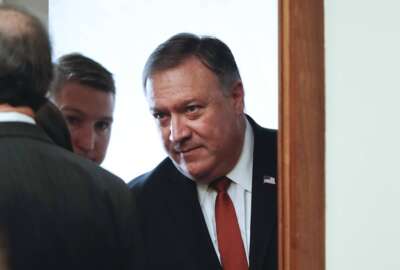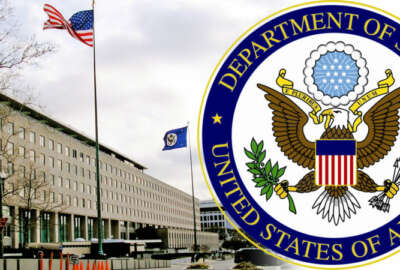
State Dept. recognizes spouses for overseas volunteer work
Whether it's standing up an emergency medicine program in Mozambique or developing a love for reading in the children of Mexico, the men and women who travel...
Best listening experience is on Chrome, Firefox or Safari. Subscribe to Federal Drive’s daily audio interviews on Apple Podcasts or PodcastOne.
Whether it’s standing up an emergency medicine program in Mozambique or fostering children’s love of reading in Mexico, the men and women who travel overseas alongside their spouses in the Foreign Service often serve in pivotal roles.
Agency spokeswoman Heather Nauert awarded the Secretary of State Award for Outstanding Volunteerism Abroad to the spouses of three Foreign Service officers, and one recently retired Foreign Service officer, at a Nov. 15 ceremony.
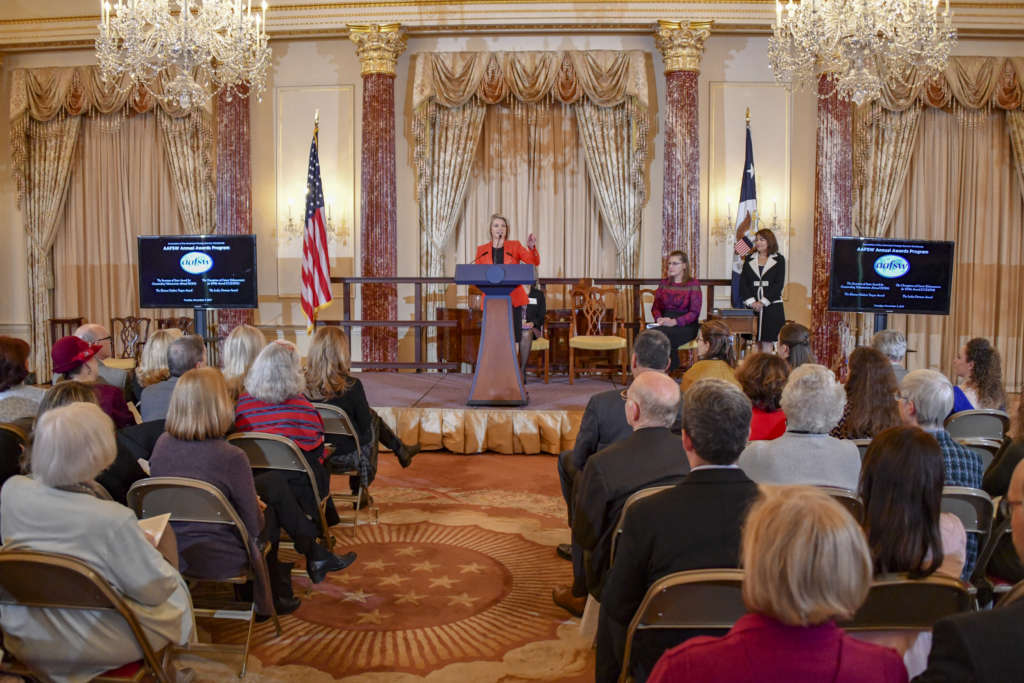
“Your efforts make our Foreign Service families stronger, which in turn strengthens our government’s ability to successfully conduct our foreign affairs,” Nauert said. “As Secretary [Mike] Pompeo often says, you don’t get a paycheck, but your work is just as important.”
As of September, the Foreign Service consists of more than 14,000 officials working at nearly 300 posts across the world. But they also bring with them more than 12,000 adult-age family members.
A subset of those, known in State Department parlance as Eligible Family Members, consist of the spouses, domestic partners, unmarried children under the age of 21, and dependent parents or siblings who are listed on Foreign Service officers’ travel orders.
In May, Pompeo lifted the hiring freeze on both agency employees and EFMs, a move that Nauert said has helped improve morale at the agency.
“We were so proud of that. And he said to me, ‘This is a no-brainer,’” she said. “So we’re grateful to him for making that decision.”
Pompeo originally planned to deliver the award keynote address, but was called away to a meeting with Mexican officials in Houston. However, his wife, Susan, thanked the award recipients on his behalf.
“The legacy that you have left this organization and those people in those places where you chose to give a little part of you will absolutely exist in perpetuity, and we are grateful and unbelievably impressed,” Susan Pompeo said.
Training emergency physicians in Mozambique
Abigail Hankin-Wei is an emergency medicine attending physician. Both she and her husband, an assistant program manager with the Centers for Disease Control, are both stationed in Maputo, Mozambique.
Working through a local medical school, Hankin-Wei launched an emergency medicine residency program, and is training the first class of emergency medicine physicians in the entire country.
“The things we often can take for granted here in the U.S. — the knowledge you can call an ambulance, the knowledge you can go to an emergency department and have a skilled, trained physician take care of you — are things that many people around the world don’t have access to,” she said in an interview following the award ceremony.
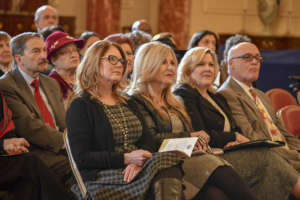
Hankin-Wei started her journey as an EFM in August 2015. Despite the recognition for her work in Mozambique, she acknowledged that having a spouse in the Foreign Service can bring unexpected twists in her life.
“I think one of the things that happens with Foreign Service families, especially Foreign Service spouses, is you probably had one plan for how your life was going to go,” she said. “And marrying the Foreign Service, marrying another U.S. government physician that takes you overseas in this way really may shake up that plan.”
“It can be frightening to let go of control and not let go of that plan you had before,”Hankin-Wei added. “But I think the recognition is, from so many of us, what you’ll find on the other side that is not that plan., is actually incredibly richer and more beautiful than what you expected.”
Finding work as a member of a Foreign Service family can be challenging. According to recent data from the State Department, more than 60 percent are unemployed. More than 2,100 family members work at jobs within U.S. embassies and consulates. But an additional 2,100 work outside of the agency mission.
But Dr. Joanna Athanasopoulos Owen, president of the Associates of the American Foreign Service Worldwide (AAFSW), said EFMs often build valuable relationships overseas.
“It seems for the State Department, soft diplomacy is the key factor that will go further along, and soft diplomacy is usually done by the family members, not the actual employees,” she said. “These are the people that will network, these are the people that will go to parties and these are the people that will do these amazing volunteer projects to really help the community when they identify some special need somewhere.”
A panel of judges from the AAFSW and the State Department helped determine the finalists for the SOSA awards.
Foreign Service families traveling with small children face additional difficulties.
Hankin-Wei recalled that her family’s first overseas residence had a shower, but no bathtub. That, she said, posed a challenge raising two young children. At the time, her youngest was 15 months old.
“For a while, after we arrived at post, whenever somebody else in the mission community would invite us to dinner, we’d say, ‘We’d love to come to dinner. Also, can we arrive early and give our kids a bath?'”
Before traveling moving onto their next post, Hankin-Wei expects six physicians will have completed the program’s training.
“The extent that we as a country, we as individuals can strengthen that emergency care network, we actually also help to strengthen and buttress the rest of our global public health efforts,” she said.
Reaching out to women in China
Nicola Hil, stationed in Guangzhou, China for two years, was recognized for her efforts managing the consulate’s “Women in Society” group. Through this organization, Hil has helped launch public awareness events on domestic violence and sexual assault, as well as networking events for Chinese women entrepreneurs.
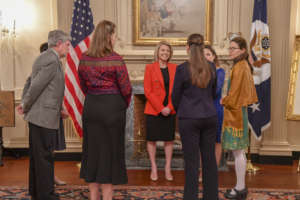
Because of the lack of a bilateral work agreement between the U.S. and China, spouses can only work at the consulate. But due to security concerns, consulate workers generally need security clearances.
“Spouses are put in an interesting situation, because we’re often not coming in as employees, but we are actually interacting with locals more than our direct-hire spouses are, because they’re working nine-to-five at the consulate — even working some longer hours than that,” Hil said. “But we’re out in the community and we need things to do, because we’re trying to adjust to life there.”
Despite being more than 8,000 miles away from Washington, D.C., Hil said policy decisions domestically can have a significant ripple effect at foreign posts.
“I definitely saw, over the course of our time in Guangzhou, that morale went up and down, especially with the hiring freeze,” she said.
Despite the contentious relationship between U.S. and China, Foreign Service family members play a big role in improving those relationships.
“You as an EFM, get to set the tone from your family,” Hil said. “You get to set the tone for your community.”
Her best advice for new EFMs is “not to shy away from doing the things you want to.”
In Guangzhou, she said she took Mandarin lessons and joined an international choir and orchestra, which allowed her to interact with locals.
“Just having conversations, recognizing also that any interaction that we have with locals reflects on the United States as well. They see us and they see that we’re Americans and they may already have judgments about who we are and what we’re going to be like,” Hil said. “I think being a kind, open person willing to talk to people was really great for me, but also good for the U.S. relations there.”
However, Hil and her husband are gearing up for a move to their next post in Pakistan in May 2019.
Tracking down ancestors in Cyprus
Matt Ellsworth, a recently retired member of the Foreign Service, was recognized for his volunteer work in helping the people of Cyprus track down ancestry records. Ellsworth’s genealogical database already contains more than 25,000 names, but he believes he has access to enough resources to provide twice that.
Related Stories
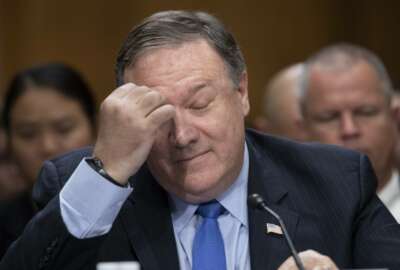
Pompeo faces uphill battle staffing career, political ranks in State Department
“They could see that my project, whether I intended originally or not, reaches across the divide. It’s a unifying sort of thing,” Ellsworth said. “Here’s somebody in the Foreign Service spending his spare time on a volunteer basis to do what the embassy is trying to do officially: Promote communal understanding and unification in Cyprus.”
While the Foreign Service offers opportunities for Americans to immerse themselves in the local culture, Ellsworth said not everyone in the Foreign Service community takes advantage of that.
“There are some who go overseas and do their best to pretend that they have not gone overseas – meaning that they frequent the supermarkets that have the American products. They use all of the kind allowances that the State Department has so that you can, if you want, live a very American life,” he said. “They don’t necessarily step into the issues, they don’t necessarily step into the hearts and minds of the local community. The people who with me received the awards today, have stepped into those communities in a big way.”
Developing a love of reading in Mexico
Jessica McInerney, an EFM stationed in Ciudad Juarez, Mexico, earned the award for her work building a library at a local school containing more than 2,000 books in English and Spanish.
“Because I was able to start this library and give these children an opportunity to check out books on a weekly basis, and give them a variety of books to choose from, where they may not have even been exposed to certain types of books in the past, it just instills that love of reading,” she said.
McInerney also helped raise $6,000 for the school library to buy new books. She agreed that finding projects to work on overseas requires a self-starter attitude.
“I just have to see some sort of opportunity or decide what I want to do and just go after it,” she said. “I can’t wait for someone to give me a call or send me an email with some sort of opportunity, or ask someone to help me … I just have to go out there and do it.”
Copyright © 2025 Federal News Network. All rights reserved. This website is not intended for users located within the European Economic Area.
Jory Heckman is a reporter at Federal News Network covering U.S. Postal Service, IRS, big data and technology issues.
Follow @jheckmanWFED


